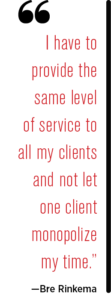Don’t be afraid to reject a property listing if you feel the fit isn’t right for your business
By Jason Henninger
When Angela Peterson, CRS, sales agent at RE/MAX Southern Collection in West Columbia, South Carolina, started in real estate, she faced serious pressure.
 She had lost her job, had next to nothing in the bank and was actively fighting cancer. The impetus to succeed was substantial, and as a result, she made it her policy to always say yes when it came to listings, no matter how challenging.
She had lost her job, had next to nothing in the bank and was actively fighting cancer. The impetus to succeed was substantial, and as a result, she made it her policy to always say yes when it came to listings, no matter how challenging.
In the beginning, just out of school, this was a winning strategy, with results far ahead of her fellow trainees. Despite radiation treatment and multiple surgeries, Peterson sold 24 homes in her first year. But her “always yes” policy backfired with a few difficult clients. As a result, her home life and health suffered, as did her other clients. “It wasn’t worth it,” she recalls.
The drive to sell and succeed is strong for residential real estate professionals. Without that passion to close, agents wouldn’t last long in the business. But sometimes the money made from the sale comes with a price of its own, in terms of the mental strain from dealing with unpleasant, overly aggressive or otherwise unreliable clients, to say nothing of the hours of unnecessary labor spent trying to reign in an unruly seller.
While a newer agent may be hungry to establish themselves and take on any home that comes their way, many agents find over time that it pays to be aware of warning signs and know when to walk away. But this can be tricky. What are some reliable warnings to help spot a troublesome client? And at what point do you say “enough?” Should you let them down nicely or be blunt? Do you pass the lead on to a trusted colleague?
Time is money
“Most of us would say that we sell real estate when asked what our work is,” says Nadine Krasnow, CRS, broker and owner at Falmouth Fine Properties in Falmouth, Massachusetts. “But I learned early in my now 44-year career as a real estate agent that what I’m really selling is my time. Homes are the vehicle through which I sell my time.”
Time in general may be infinite, but your personal time is not. “Being a solo agent, I have to be selective with my time,” says Bre Rinkema, an agent at Structure Real Estate Group in Colorado Springs, Colorado. “I have to provide the same level of service to all my clients and not let one client monopolize my time. So, it’s important for me to understand the person I will get the opportunity to work with and interview them as much as they’re interviewing me.”
Trouble ahead
The biggest warning of all is outright hostility. “I’ve had clients who, even in my initial consultation, have screamed at me and put me down, acting like they know more than I do. I look out for those types of people,” says Rinkema.
In some cases, prospective clients may begin by making degrading statements, claiming that the real estate business is a scam or they know more than agents do. “I made a pact with myself that when their behavior tells me they can’t control themselves, meaning when they start yelling, I will go ahead and believe them. This isn’t going to get better, and I can’t fix this,” Peterson says. After that, she walks away from the opportunity.
For Krasnow, the issue centers on whether a client will waste her time. “The question I ask myself of every interaction is ‘How will this affect my productivity?’ Actions and interactions that have a low prospect of ending in a sale go to the bottom of my list or are rejected outright,” she says. “For this reason, I don’t work with clients who are working with other agents, and I refuse listings if the seller is adamant about
an overpriced value.”
Dishonest or misleading details are a red flag for Rinkema. “I want to make sure that they’re accurate about their home and don’t feel like they’re hiding anything. I do a lot of research upfront, fact-checking all the information I possibly can,” she says. “I’m getting all that information in hopes that the client will tell me upfront because then it tells me that they want to be an honest and accurate seller and not deceive a buyer.”
Moving on
What’s the best way to part company when a client is clearly not a good fit? If there is a perceived threat, the best thing to do is remove yourself from the situation quickly. That’s not the time to be concerned about building relationships.
However, if the issue concerns personality or timing, giving them the contact information for a few other agents might be sufficient. Peterson always tries to pass along the business to someone she knows. “If they still want an agent, I’ll let them know of someone in my brokerage that is good for them,” she says. A client who is rude to one agent might behave differently with another, especially after being turned down.
Rinkema feels the best policy when letting a prospective client go is to be gentle about it. “I let them know that maybe I’m not the right fit for them and that my whole purpose as a real estate agent is finding the best fit for the right people.” After that, she recommends colleagues.
For Krasnow, the answer lies in being direct. “Whether or not they agree, taking a firm professional position regarding the value of my time is the right thing to do,” she says.
Ultimately, it comes down to setting boundaries and valuing your time more than chasing numbers. It can help to remember that making a sale may be the destination, but it isn’t the only point that matters in the journey. The journey is establishing a resilient, reliable and fulfilling career full of rewarding interactions.
Learning to Say No
When you first trained to be an agent, you were likely schooled on test prep, laws and regulations and how to make a sale. You probably weren’t taught how to turn away from a bad prospect, which may be uncomfortable.
Here are a few steps that might help if saying no is hard for you.
- Determine your priorities. Write down a mission statement outlining what matters most in your career.
- Set and value your goals. Setting goals establishes a clear vision. Honor your goals through consistency.
- Respect your boundaries. Your boundaries may feel harsh at first and hard to maintain. But before long, those boundaries clear a path for you to go for what you want.
Better manage client relations with RRC eLearning Negotiations—Evolving Client Expectations at CRS.com/education.
Photo: Getty Images/johnnyscriv








